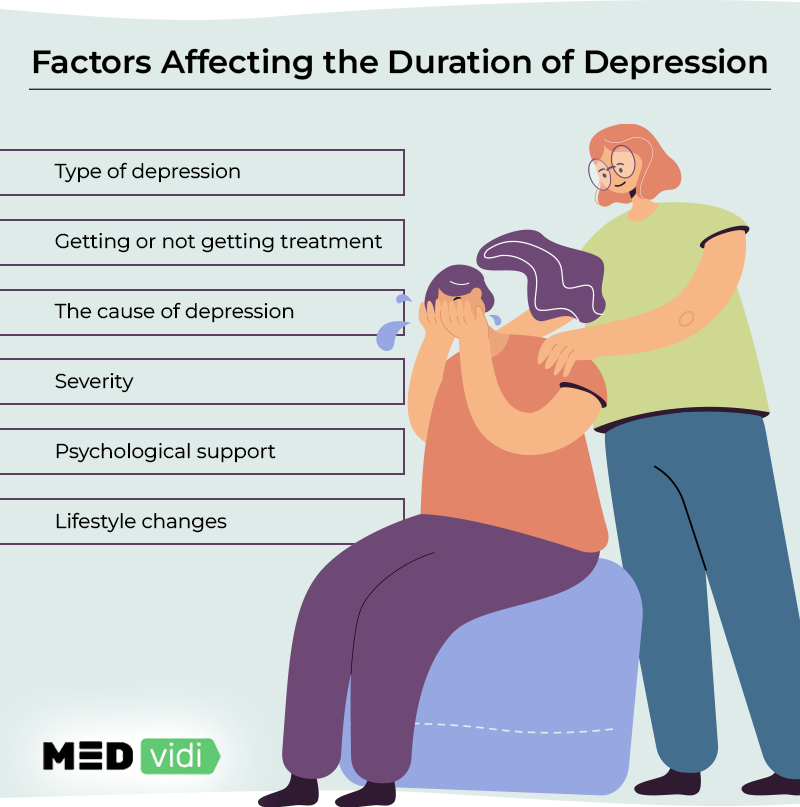The symptoms and duration of depression vary widely from person to person, depending on multiple factors. For some, the depressive episode is usually transient, resolving after only a few days. However, others experience a protracted battle with this mental health disorder and only see depression getting worse. The varying nature of experiences makes it challenging to predict whether your depression will go away on its own or require treatment. Nevertheless, the greater the severity of the disorder, the higher the chances that it will not go away without proper help.
Instead of waiting for the depression symptoms to resolve spontaneously, it is important to seek treatment. Besides helping you feel better quickly, prompt treatment averts the potentially devastating consequences of depression. Therapists and doctors usually customize treatments for each person, depending on the precipitating and perpetuating factors.
Understanding Depression
Depression is a serious psychological disorder that causes low mood and feelings of hopelessness, guilt, and anxiety. The World Health Organization (WHO) estimates that depression affects
According to the DSM-5, depression meets the diagnostic criteria only when the symptoms last for not less than two weeks. Typically, the symptoms of a depressive episode include:
- Low mood or feeling of sadness.
- Lack of interest in previously enjoyed activities.
- Changes in appetite and weight.
- Sleep disturbance.
- The feeling of guilt and worthlessness.
- Fatigue or lack of energy.
- Problem-making decisions.
- Difficulty maintaining focus or concentrating.
- Agitation or irritability
The symptoms often vary in severity from person to person and can last from a few weeks to a lifetime, leading to different forms of depression. For instance, if the symptoms are not severe but persist for more than two years, the doctor will label it persistent depressive disorder (PDD). Each type of depression has a unique prognosis.
If you’re experiencing suicidal or self-harming thoughts and require immediate assistance, contact a crisis hotline, such as 911, 988 suicide & crisis lifeline (toll-free), or Samaritans (116-123 or via chat).
How is Depression Treated
Receiving the proper treatment reduces the length and severity of depression, helping to resume normal activities quickly. The treatment options are numerous, with the major ones being:
Medications
Referred to as antidepressants, these medications are the
The antidepressant medications usually take up to four weeks before the full benefits appear. Do not stop taking or alter the dose even if the symptoms improve unless directed by the doctor. You might have to continue taking the medications for up to six months after symptom resolution.
Psychotherapy
Although the medications alleviate the symptoms of depression, they are not the only option to manage the disorder. To help achieve better results,
For example, cognitive-behavioral therapy is the form of psychotherapy often employed in treating mild depressive disorders. It challenges negative thought patterns and encourages positive behavioral responses to different situations.
Other remedies for depression include
Will Depression Go Away or Will It Worsen Without Treatment? Three Main Factors
Depression symptoms can improve without treatment, especially if the trigger is temporary and the disorder’s severity is mild. But according to research, a depressive episode might last up to
Whether depression will resolve on its own or worsen when not treated is usually dependent on factors such as:
- Type of Depression
Some depressive episodes are mild and last only a few weeks, requiring no long-term treatment. On the other hand, others last several months to years and must be treated to prevent complications. For example, seasonal affective disorder occurs during winter and eases as spring sets in, unlike persistent depressive disorder (PDD), which persists regardless of the season unless treated.
- Etiology
The
- Severity
Mild depression might go away without formal treatment, unlike moderate to severe depression, which requires treatment to subside. Regardless of the severity, the remedies, including psychotherapy and medications, are highly effective, with more than

Can Depression Be Cured?
While depression is not curable, it is still one of the most treatable mental disorders. With proper treatment with antidepressants, remission is possible. However, antidepressant medications temporarily modify the brain’s chemistry to improve symptoms. Even though they can bring relief and have proven efficacy, they usually may not eliminate the underlying cause of depression, which can lead to relapse in the future when pharmacological treatment is stopped. So, to learn how to deal with depression triggers effectively and make remission long-term, one may consider supplementing medications with psychotherapy.
Conclusion
So, does depression ever go away? This serious mental health disorder can be managed with the help of certain interventions. Still, waiting for the symptoms to disappear on their own is not recommended. While it is possible for mild depression, moderate and severe cases require a person to get professional help.










